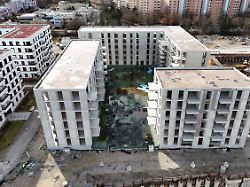On the verge of a recession
Inflation and a slowdown in construction are slowing down the economy
February 23, 2024, 10:08 a.m
Listen to article
This audio version was artificially generated. More info | Send feedback
The German economy is in the doldrums. GDP shrank by 0.3 percent at the end of the year. The reasons are complex. Companies are holding back on investments, construction is in the doldrums and demand is weakening. The outlook for the coming months is also cloudy.
The German economy is on the verge of recession due to falling investment. The gross domestic product (GDP) shrank by 0.3 percent from October to December compared to the previous quarter, as the Federal Statistical Office explained, confirming an earlier estimate. In the previous two quarters there was at least stagnation, and at the beginning of 2023 there was at least a mini-plus of 0.1 percent. “In the final quarter, declining investment slowed down the economy, while consumption increased slightly,” said Statistics Office President Ruth Brand.
The economy was slowed down from several sides. The high inflation dampened the purchasing power of private households, which nevertheless increased their consumer spending slightly by 0.2 percent. The European Central Bank (ECB) is combating high inflation with the highest interest rate levels in its history. The construction industry was particularly affected by this: it suffered a slump in demand as many potential home builders’ dream of owning their own four walls was dashed due to the expensive financing costs. Construction investments fell by 1.7 percent at the end of 2023.
Exporters, in turn, were hit by the weak global economy and caused a decline of 1.6 percent compared to the previous quarter. According to the federal government, a recovery in the German economy will largely fail this year. The government points to the poor global economy, high interest rates and a lack of workers: Economics Minister Robert Habeck sees, in addition to the adverse conditions, the traffic light government’s share of the blame for the problems. “We are coming out of the crisis more slowly than we had hoped,” Habeck recently admitted when presenting the annual economic report. The traffic light coalition made up of the SPD, Greens and FDP has reduced its growth forecast for this year from 1.3 to just 0.2 percent.
Hardly any hope for a strong economic recovery
The German economy remains at acute risk of recession. The purchasing managers’ index for the private sector – industry and service providers together – surprisingly fell by 0.9 points to 46.1 points in February, as the financial services provider S&P Global found in its monthly company survey. The barometer thus moved further away from the growth threshold of 50 points, which has now been missed for eight months.
“The German economy remains under pressure,” said economist Tariq Kamal Chaudhry of Hamburg Commercial Bank (HCOB), which is sponsoring the survey. This is primarily due to industry: Here the barometer, which is widely followed on the financial markets, fell by 3.2 points to 42.3 points. “Things are looking pretty bleak for German industry now,” said Chaudhry. They suffer from high interest rates, expensive energy, geopolitical risks and a weak global economy. Production is falling sharply and new orders from home and abroad are “deteriorating drastically”.
There was a ray of hope in public finances. Last year the tax authorities once again spent more money than they took in. However, the federal, state, local and social insurance deficits fell by 9.5 billion euros to 87.4 billion euros compared to the previous year, partly because a large part of the expenditure to combat the pandemic was omitted.
